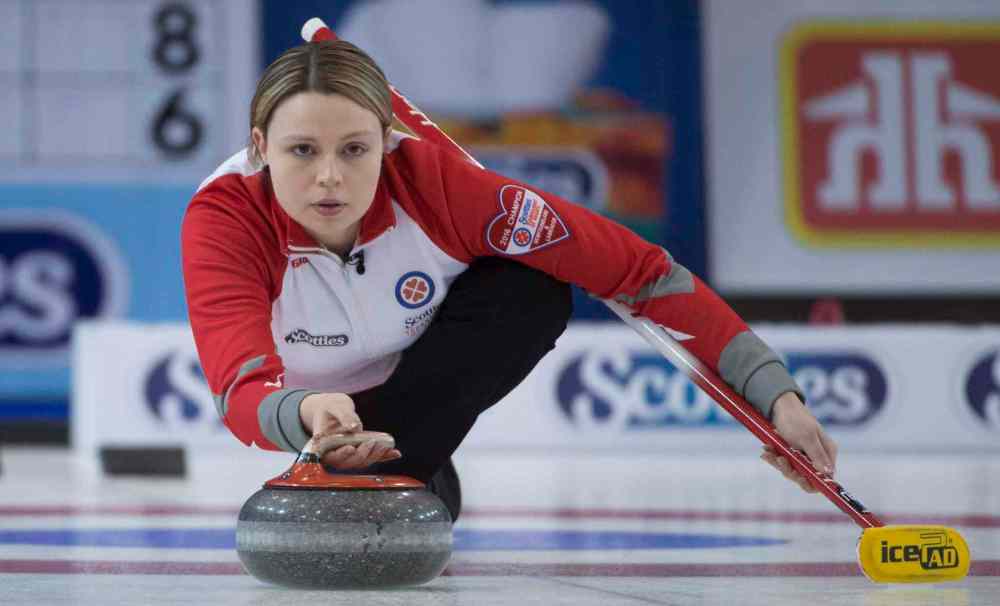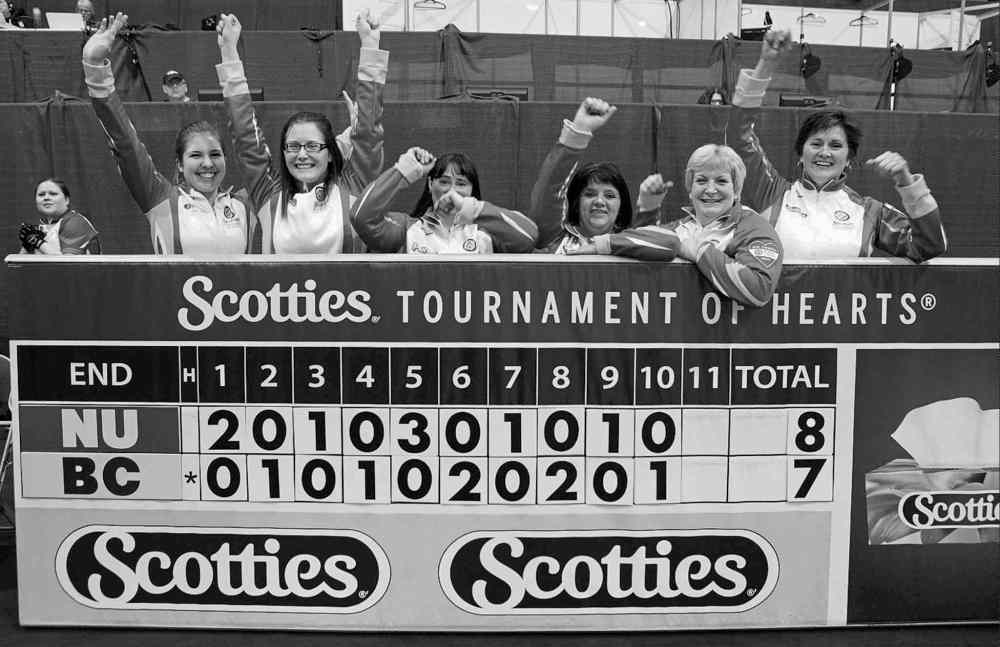Curling still humble enough to be lovable
Even the game's elite just ordinary superstars
Advertisement
Read this article for free:
or
Already have an account? Log in here »
To continue reading, please subscribe:
Monthly Digital Subscription
$0 for the first 4 weeks*
- Enjoy unlimited reading on winnipegfreepress.com
- Read the E-Edition, our digital replica newspaper
- Access News Break, our award-winning app
- Play interactive puzzles
*No charge for 4 weeks then price increases to the regular rate of $19.00 plus GST every four weeks. Offer available to new and qualified returning subscribers only. Cancel any time.
Monthly Digital Subscription
$4.75/week*
- Enjoy unlimited reading on winnipegfreepress.com
- Read the E-Edition, our digital replica newspaper
- Access News Break, our award-winning app
- Play interactive puzzles
*Billed as $19 plus GST every four weeks. Cancel any time.
To continue reading, please subscribe:
Add Free Press access to your Brandon Sun subscription for only an additional
$1 for the first 4 weeks*
*Your next subscription payment will increase by $1.00 and you will be charged $16.99 plus GST for four weeks. After four weeks, your payment will increase to $23.99 plus GST every four weeks.
Read unlimited articles for free today:
or
Already have an account? Log in here »
Hey there, time traveller!
This article was published 23/02/2016 (3583 days ago), so information in it may no longer be current.
GRANDE PRAIRIE, Alta. — It is a gorgeous day in Grande Prairie. The sun has warmth in it, finally. The thermometer creeps above zero, so the streets are wet.
There are only two draws at the Scotties Tournament of Hearts this day, a relatively quiet one at Revolution Place. So you wander out to explore Grande Prairie. It is a curious city, a hodgepodge of humble or aspirational architecture and wide-open space. The city is approaching 70,000 people, and growing rapidly; 10 years ago, it was just under 50,000. It’s an oil town, full of young families with children, and recently the average household income topped $100,000.
These days, though, Scotties volunteers quietly advise reporters not to ask the locals about how the Alberta economy is impacting turnout. One resident said her friends who usually go to bonspiels thought ticket prices, ranging from $20 for a weekday draw to $369 for the whole shebang, were pricey.

Weather is a safe topic, as it tends to be everywhere in Canada, and so is the curling. This is a city that loves the roaring game, and in the lead-up to the Tournament of Hearts local businesses hosted Scotties Fridays where they donned tournament T-shirts, gave out candy and tried to build up some hype.
For these efforts, they were rewarded with a certificate acknowledging them as a successful Scotties Fridays participant. Some of them dot downtown windows.
Now the rocks are sliding at Revolution Place, the momentum is harder to detect outside. At a gift shop downtown, a low-ceilinged room packed with romance paperbacks, a retro Hot Nuts stand and glass wine mugs splashed with slogans such as “Hostess With The Mostess,” one resident purses her lips a little.
“To be honest,” she finally says, “I thought I would have heard more about it.”
I thought I would have heard more about it. That may as well be the unofficial motto of curling, a sport that seems to surprise itself when it takes the spotlight. A sport in which a few household names face a steady stream of worthy contenders, who had to file for time off from work just to play live on TSN.
You flip open the official Scotties media guide, which lists the contenders’ professions. Newfoundland skip Stacie Curtis is a border services officer in St. John’s. Quebec’s Marie-France Larouche is a phys-ed teacher; you wonder what her students are thinking, if they’re watching back in Levis, Que.
The best of the best find a little more reward. Jennifer Jones lists motivational speaker next to her position as a senior legal advisor for National Bank Financial; Chelsea Carey names her occupation as, simply “curler.” In Manitoba years ago, she quit a job selling mattresses to go all-in on the circuit.
She’s one of the new breed of curlers like that, though. Charismatic, ambitious, electric on the sheet: she loves the game, and it shows every time she throws.
This is why I love curling, too. It’s why I patter about it to disinterested friends or on social media. It’s why I’ve learned to await the furrowed brows of Americans or the otherwise uninitiated — “Curling? Really?” — followed by a joke about its relative obscurity. (“Thought I would have heard more about it.”)
Look, we all know it: curling is not the NFL. It is not pro hockey. It thrives in swaths of Canada and colder parts of Europe, and has an underdog toehold in parts of the United States and Asia. Otherwise, it is mostly a quadrennial curiosity, memorable mostly for shouted Canadian accents and inscrutable rules.
(Flash back to the 2015 women’s world championship in Japan, when a German-born photographer approached me: “Do you understand what is the point of this game?”)

This is what makes curling special. It’s why I fell in love with the sport, entirely unintentionally. It’s why, I guess, I now find myself sitting in hotel rooms in Winkler or Moose Jaw or Grande Prairie, trying to wrap my fingers around words about curlers, Canadiana, and what it means to revel in a Scotties.
Here’s what I land on: I’ve been a sports fan, and lately a sports reporter, but mostly I’m a fan of stories. And sport’s most moneyed stories have never struck me as uniquely compelling; there is a sort of narrative flatness in Peyton Manning winning his billionth championship, in tales of exceptional winners winning.
Curling is different. Structurally it’s quirky, akin to baseball in the way it punctuates calm and steady pacing with sudden bursts of sheer terror or elation. Culturally, though, it’s something else entirely. Something we lost, when sports became mammoth business and pro athletes became closer to gods.
These are human stories. To follow high-end curling is to follow the life story (mostly) of skips, told in languid arcs that can spend decades collecting trivia bits. Almost every match is a reunion of former teammates, or a rematch of some pivotal past game. All these stories, unfolding in distinctly cosy ways.
So there is Jenn Hanna Sunday, chatting for what feels like the millionth time already about the last time she made the Scotties, and wound up in a championship final that made history for Jennifer Jones. If Hanna is tired by the popularity of this topic, she doesn’t show it, and I love her for that.
Because that is the heart of curling: stories of normal people trying, and sometimes succeeding. It is the fight for the right angle, for the consistency of inches, knowing that may not translate to riches. It is the stories of endless practices in the club, largely without much expectation of exotic reward.
Sure, maybe you’ll clean up on the cash circuit, or go to the Olympics. More likely, you just get to take a week off work to contend for a Canadian championship. And at this Scotties, as in every one before, they meet on equal ice: the icons and the everyday folk, trying under the same lights.
melissa.martin@freepress.mb.ca
Our newsroom depends on a growing audience of readers to power our journalism. If you are not a paid reader, please consider becoming a subscriber.
Our newsroom depends on its audience of readers to power our journalism. Thank you for your support.
History
Updated on Tuesday, February 23, 2016 1:58 PM CST: Fixes headline, replaces photo


